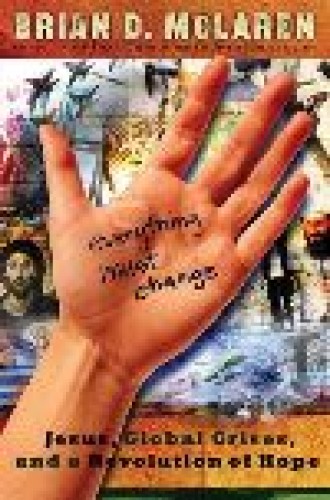Everything Must Change
Brian McLaren may not eat locusts or wear clothing made of camel’s hair. But in Everything Must Change, this modern-day prophet issues a piercing critique of a U.S. church which, he says, too often serves as a force of “domestication, resignation, pacification, and distraction” rather than “liberation and transformation.” All the while, a perfect storm of global crises gathers ominously on the horizon. But like the prophets of old, McLaren balances his warnings of impending doom with a compelling invitation “to defect” from the world’s “suicide system” and to join Jesus’ nonviolent insurgency of peace, generosity and sustainable living.
McLaren taught college English for 18 years and pastored the nondenominational church he founded in Spencerville, Maryland, for 24. In the past decade he has become a leading voice in the Emergent church movement and a prolific and sometimes controversial author. In 2005, Time magazine named him one of the “25 most influential evangelicals in America.” Everything Must Change is a sequel to an earlier book, The Secret Message of Jesus (2006), in which he focused on the kingdom of God. In his new book, McLaren asks: “What would change if we applied the message of Jesus—the good news of the kingdom of God—to the world’s greatest problems?”
Calling a book Everything Must Change may strike some as hubristic, but it expresses well the book’s all-encompassing scope. McLaren opens with a survey of global-crisis literature and describes a planet beset by four closely interlinked crises. First, we face a prosperity crisis caused by our unsustainable consumption of the world’s resources and our massive production of waste. Second, we have an equity crisis that is creating a yawning chasm between the world’s poor majority and its wealthy minority that has led to growing rage among the former and mounting fear among the latter. Third, we have a security crisis in which groups and nations are increasingly resorting to violence—whether terrorism or preemptive war—to resolve conflicts over diminishing resources. Perhaps McLaren’s most insightful contention here is that the current U.S. “war on terror” is at its core a suicidal battle between an anxious global empire of the rich and an angry insurgency of the poor. Finally, McLaren argues that our world suffers from a spirituality crisis caused by the failure of the world’s religions—particularly Christianity—to confront and engage our global dysfunctions.
This book’s most significant contribution is its incisive look at the competing “framing stories” of our world and of Jesus Christ. McLaren argues that the world’s crises are being driven by a powerfully destructive and covert narrative. This story tells us that we are godlike creatures who are free to live without moral or ecological limits and that we exist merely to consume products and experience maximum pleasure. The devastating consequences of this story are becoming increasingly evident in our families, communities and environment.
McLaren convincingly argues that Jesus exposed and confronted this suicidal story, which already existed in his own day, and offered a radically different one. His new framing story tells us that we have been created not “to shop” but to live in loving relationship with our Creator, one another and creation. This new narrative gathers us into faith communities that proclaim and embody God’s liberating and nonviolent love. It leads us not to escape our troubled world but to engage its crises so God’s will may be done on earth as it is in heaven. Evoking September 11, McLaren provocatively writes that the followers of Jesus are called to “fly airplanes of generosity into towers of need and plant improvised encouragement devices [IEDs] by roadsides and in neighborhoods everywhere.”
In a book so focused on the dominant systems of our day, I found it surprising that McLaren mentions only once the New Testament’s theme of principalities and powers (Colossians 1), and then only tangentially in his closing chapter. His analysis of the destructive potential of our world’s structures would have been strengthened if he had integrated this crucial concept.
McLaren clearly recognizes that it is going to take more than a book to inspire American Christians to engage the urgent global crises of our day. It will require a profound transformation in our worship life, in what we sing about, and in the kinds of sins we confess each Sunday. With some fellow musicians, McLaren has recorded a CD called Songs for a Revolution of Hope to begin to fill this vacuum. He is also trying to connect with the younger, media-savvy generation by posting clips about his book’s central ideas on YouTube and maintaining a Web site (www.deepshift.org) as a venue for further conversation.
As a pastor of a congregation in Chicago’s wealthy suburbs, I found this book tremendously compelling, challenging and troubling. Everything Must Change left me asking two questions: What does defection look like when it is practiced by faithful Christian communities in the United States? And where in our nation are Jesus’ followers actually making radical changes commensurate with the urgent crises we face and providing one another with the mutual support necessary to sustain this new way of living? McLaren’s most recent work begs for its own sequel.





